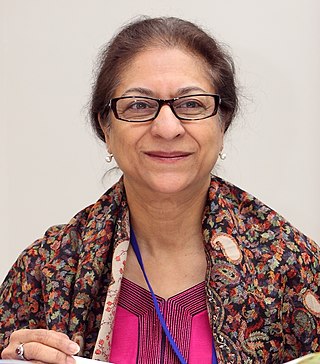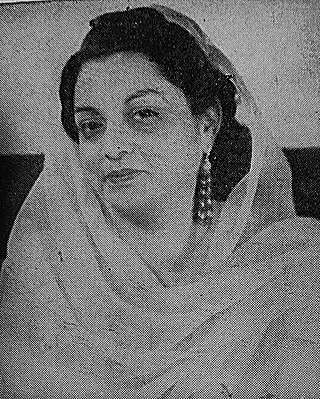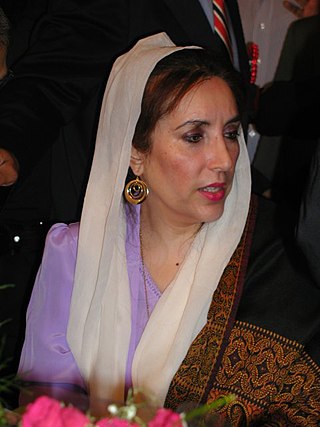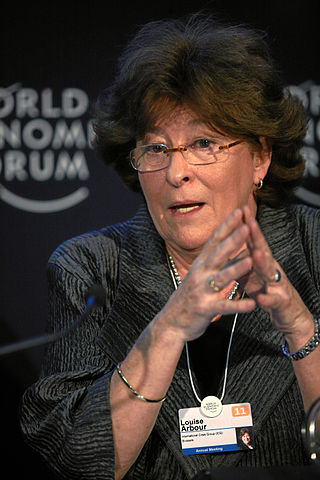
Yasmeen Lari is Pakistan's first female architect. She is best known for her involvement in the intersection of architecture and social justice. Since her official retirement from architectural practice in 2000, her UN-recognized NGO Heritage Foundation Pakistan has been taking on humanitarian relief work and historical conservation projects in rural villages all around Pakistan. She was awarded the prestigious Fukuoka Prize in 2016 and the RIBA's Royal Gold Medal in 2023.

Asma Jilani Jahangir was a Pakistani Muhajir human rights lawyer and social activist who co-founded and chaired the Human Rights Commission of Pakistan and AGHS Legal Aid Cell. Jahangir was known for playing a prominent role in the Lawyers' Movement and served as the United Nations Special Rapporteur on Freedom of Religion or Belief and as a trustee at the International Crisis Group.
Bina Shah is a Pakistani writer, columnist and blogger living in Karachi.

Begum Ra'ana Liaqat Ali Khan was the First Lady of Pakistan from 1947 to 1951 as the wife of Liaquat Ali Khan who served as the 1st Prime Minister of Pakistan. She was also the first female governor in Pakistan, serving Sindh. She was one of the leading woman figures in the Pakistan Movement, and a career economist, and prominent stateswoman from the start of the cold war till the fall and the end of the Cold War.
Ghulam Ali Allana known as G. Allana was a friend and biographer of Muhammad Ali Jinnah, the founder of Pakistan. Mr. Allana entered politics at an early age and played an active part in the Pakistan movement. After Partition, he was instrumental in forming the Federation of Pakistan Chambers of Commerce & Industry. He was a member of the West Pakistan Legislative Assembly, besides being the mayor of Karachi. Internationally, Mr. Allana represented Pakistan at over 100 conferences, served on the governing body of the International Labour Organisation, and the president of the International Organisation of Employers, Brussels. At the United Nations he led a number of peace and diplomatic initiatives/working groups and went on to become chairman of the United Nations Commission on Human Rights in 1975. For his contributions he was awarded the United Nations peace medal and was also a nominee for the Nobel Peace Prize in 1977. He was also an English-language Pakistani poet and a counselor and friend to Fatima Jinnah, Muhammad Ali Jinnah's sister.

Women in Pakistan make up 48.76% of the population according to the 2017 census of Pakistan. Women in Pakistan have played an important role in Pakistani history and have had the right to vote since 1956. In Pakistan, women have held high office including Prime Minister, Speaker of the National Assembly, Leader of the Opposition, as well as federal ministers, judges, and serving commissioned posts in the armed forces, with Lieutenant General Nigar Johar attaining the highest military post for a woman. Benazir Bhutto was sworn in as the first woman Prime Minister of Pakistan on 2 December 1988.

Christianity is the third largest religion in Pakistan and the second largest Abrahamic religion there, making up about 1.37% of the population according to the 2023 Census. Of these, approximately half are Catholic and half Protestant. A small number of Eastern Orthodox Christians, and Oriental Orthodox Christians also live in Pakistan.
The publishing industry in Pakistan is hampered both by a low literacy rate (65%).
Begum Jahanara Shahnawaz, also known as Jehan Ara Shah Nawaz, was a prominent activist and politician in Punjab, active before and after independence of Pakistan. She was educated at Queen Mary College, Lahore. A dedicated member of the All India Muslim League, she was also a leading advocate for women's rights. She was the daughter of Sir Muhammad Shafi and the wife of Mian Muhammad Shahnawaz.

Sharmeen Obaid-Chinoy is a Canadian-Pakistani journalist, filmmaker and political activist known for her work in films that highlight gender inequality against women.
Prof. Abdul Rahim Nagori was a Pakistani painter known for his socio-political themes. He has held one-man exhibitions since 1958. He taught at the University of Sindh in Jamshoro, Pakistan where he founded and headed the department of Fine Arts.
Tariq Rahman is a Pakistani academic scholar, newspaper columnist, researcher, and a writer.
Karachi Literature Festival (KLF) is an annual international literary festival held in Karachi, Pakistan. It is the first festival of its kind in Pakistan. It is one of the world's youngest and fastest growing literary festivals. Till 2019, ten festivals have been held.
John Berchmans Conway, R.J.M., usually known as Sister Berchmans, was an Irish Roman Catholic religious sister and teacher who worked in Pakistan for 60 years. In 2012 she was decorated by the Government of Pakistan for her services in education and promoting interfaith harmony.

Ajoka Theatre is a Pakistani not-for-profit arts organization based in Lahore, Punjab, with focus on producing and performing social theatrical stage productions, founded in 1984. The group was formed by director, actress and playwright, Madeeha Gauhar at peak of the tensions during the state of emergency under the regime of General Muhammad Zia-ul-Haq. Ajoka Theatre received the prestigious Prince Claus Award in 2006 and the International Theatre Pasta Award in 2007.
Begum Akhtar Riazuddin also spelt Riaz-ud-din or Riaz-ud-deen was a Pakistani feminist activist who was also the first modern Urdu-travelogue writer. She received many awards in recognition of her efforts.

Women in law describes the role played by women in the legal profession and related occupations, which includes lawyers, paralegals, prosecutors, judges, legal scholars, law professors and law school deans.
Naushaba Burney was a journalist from Pakistan. She was the country's first female journalist.
Fariha Razak Haroon was a Pakistani politician and journalist who was a member of the Provincial Assembly of Sindh from 2002 to 2007. She became the first Pakistani writer to be recognised by the International Federation of Journalists. Her writing also earned her and Pakistan for the first time the prized European Commission's "Lorenzo Natali Prize for Journalism" in 2000.
Ayesha A. Malik is a Pakistani judge. She is the first female judge of the Supreme Court in the history of Pakistan. On 6 January 2022, the Judicial Commission of Pakistan approved her appointment to the Supreme Court of Pakistan. She took her oath of office on 24 January 2022. Malik has also served as a Judge of the Lahore High Court in Pakistan from 27 March 2012 to 5 January 2022.







